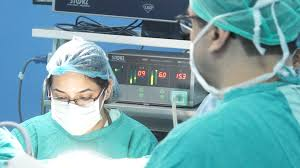The small intestine is the longest part of the digestive system which connects your stomach to your large intestine. It does most of the digesting of the food. Most digestion such as breaking down food and absorbing nutrients, all take place in the small intestine. There are several conditions that may bring the need for surgery of the small intestine, also known as small bowel. Problems with small intestine can include:
-
Bleeding
-
Infection
-
Crohn’s disease (inflammatory bowel disease)
-
Intestinal cancer
-
Intestinal obstruction
-
Irritable bowel syndrome
-
Ulcers
Surgery is often aimed at removing compromised sections of the small intestine and joining back its healthy parts by reconnecting the resected ends.
Crohn’s disease
There are two forms of inflammatory bowel disease (IBD)- Crohn’s disease and ulcerative colitis. It is a chronic disease that causes inflammation and irritation in your digestive tract.
Symptoms: The most common symptoms of Crohn’s disease are diarrhea, cramping and pain in the abdomen. You might even notice weight loss. Symptoms may also vary depending on the location and severity of the inflammation. It is said that stress can make symptoms worse.
Causes: Crohn’s disease sometimes runs in family. According to experts, it may happen when bacteria in the digestive tract can mistakenly trigger your immune system which further causes inflammation leading to symptoms of Crohn’s disease. Some other reasons may be smoking, high-fat diet and/or anti-inflammatory drugs such as aspirin and birth control pills.
Diagnosis: Combination of tests are conducted to diagnose Crohn’s disease. In physical tests, the doctor checks the bloating in the abdomen and check for the tenderness and pain in the liver to see if it is enlarged or abnormal.
Tests: The tests to be performed may include: lab tests- blood test and stool test, intestinal endoscopy, Upper gastrointestinal series (GI), CT scan. The doctor may request you a colonoscopy to examine the large intestine. Image testing may give the doctor a better idea about the problem.
Treatment: The aim of treatment is to decrease the inflammation in the intestine. Treatment includes medication, alterations in the diet and nutrition and even surgical procedure where the damaged portions are removed. All this completely depends on the condition of the patient.
-
Medication: The medicines suppress your immune system’s abnormal inflammatory response which is causing symptoms. Suppressing inflammation will not only give relief from pain, fever and diarrhea but also heal the intestinal tissues. In addition to it, medicines decrease the frequency of maintaining remissions.
-
Diet and Nutrition: Crohn’s disease may be the reaction of bad food, so the diet needs special attention that may help reduce the symptoms, replace missing nutrients and promote healing. Crohn’s symptoms like diarrhea often reduce the appetite and ability to absorb protein, carbohydrates, minerals, vitamins and other necessary nutrients. The doctor may recommend you to restrict your intake of dairy if they find you to be lactose-intolerant.
-
Surgery: Laparoscopic surgery is commonly used in case of Crohn’s disease. Laparoscopic surgeries reduce the length of the hospital stay and post-surgery complications. The primary benefits of laparoscopic surgery over open surgery are a quicker return to bowel function, decreased wound infection rates and shorter hospital stays. The goal of the surgery is to relieve the symptoms and inflammation. Crohn’s disease such as small bowel resection uses laparoscopic surgery for the treatment.
-
Recovery: The recovery in laparoscopic surgery is really quick. The person can resume his work within 2 weeks if they stick to the given post-surgery instructions and diet changes.
There are many advantages to having this procedure performed laparoscopically rather than with the traditional open method:
-
Faster recovery, the patient may return home the same day or the day after the surgery. You may return to normal activities after 4 to 5 days and return to all activities after 15 days. When compared to open surgery, the procedures require two or four days longer in the hospital and four to six weeks of recovery time before returning to normal activities.
-
Less pain post-surgery
-
Fewer postoperative complications
-
Cosmetic benefit, rather than one, long 6-inch incision across the abdomen, 3 to 5 small, barely visible incisions are placed in the lower abdomen.
There may be other surgeries to treat Crohn’s disease include the following:
-
a bowel resection in which the damaged portion of the intestine is removed
-
a colectomy is a surgical process of removing diseased sections of the colon
-
In a proctocolectomy, the doctor removes the colon and rectum and often creates an ostomy to collect waste products
-
The doctor, in a strictureplasty, shortens and widens the intestines to reduce the effects of scarring
Recovery Time

The recovery time may vary depending on the surgical approach and the type of surgery performed. Laparoscopic surgery people may only need to stay in the hospital for a few hours after surgery. Others may have to stay for a couple of weeks. The doctor gives an estimated recovery time for your particular surgery along with diet chart.
Your doctor will give you instructions on how to recover at home. Doctors encourage to eat a low-fiber, low-residue diet following surgery. This gives your bowel time to rest because it doesn’t have to work as hard to digest foods.
Examples of low-fiber, low-residue foods include:
-
avocado
-
canned or cooked fruits
-
potatoes
-
rice
-
well-cooked vegetables
You may occasionally feel tired or uncomfortable during recovery. However, by the end of the recovery period, you should feel better. Ideally, following post-surgery precautions should reduce your Crohn’s disease symptoms.
Author Bio:
Aisha is a passionate blogger. She has expertise in writing health articles. She have been serving society as a Health adviser. She loves keeping himself up-to-date with the news and happenings around. She is always open to learning and shares his experiences on his Greetings of the Day.
Download App to read Latest News Today
